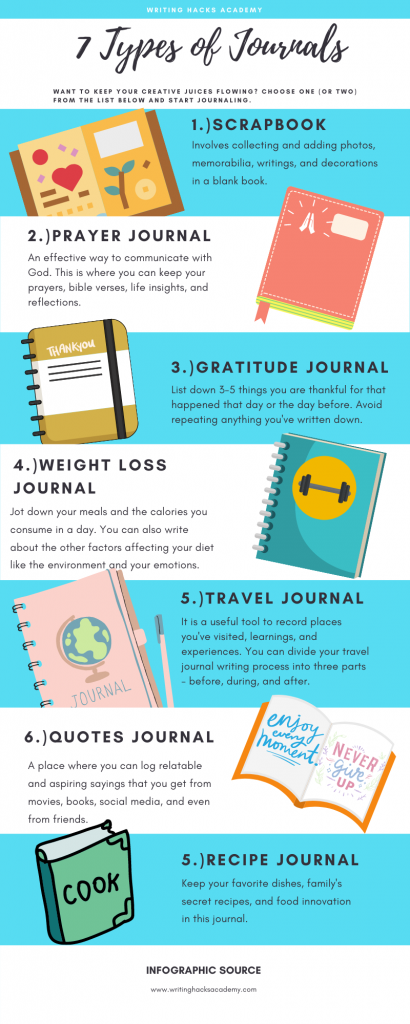Creativity is like a muscle. It grows and becomes stronger as you utilize it. Fortunately, there are many ways to show your artistic side. It doesn’t only depend on your talent in drawing or painting.
You can be creative even by doing simple activities in life. Writing, for example, can be a creative pursuit.
Besides using journal writing to express your thoughts and emotions, it is also a great practice to produce and combine ideas, and unleash some that have been hidden in your subconscious.
If you want to pursue creativity in journal writing, try making any of these journals:

1. Scrapbooking
This journaling style involves collecting and adding photos, memorabilia, writings, and decorations in a blank book. The original purpose of scrapbooking is to preserve memories for future generations, but now it’s used to challenge creativity.
Scrapbooking has evolved a lot. It started as a hobby in the 15th to 16th century and became widespread around 2005. Nowadays, you can also try digital scrapbooking.
Why a scrapbook?
- It’s pretty flexible. You can do it digitally or analog.
- You can put anything in your scrapbook. Although we usually keep our memories in photographs, we couldn’t capture everything. Ephemera make up for those moments.
- Stroll down the memory lane anytime. If you want to relive a specific event in your life, all you need to do is open your scrapbook.
2. Prayer Journal
Imagine being able to converse with God while honing your creative skills. How amazing will that be?
A prayer journal is a tool where you can keep your prayers, bible verses, life insights, and reflections. As I’ve mentioned before, creativity doesn’t always need to be grand. It can be shown through small things such as discovering new insights, thinking of a new approach to your problem, and composing your own prayers.
Although a prayer journal is something more intimate than others from this list, you are still free to experiment with it.
Why a prayer journal?
- It can help you concentrate. It’s easier to focus when writing rather than by silently praying.
- It’s an effective way to communicate with God. You can track your conversations with Him and see what prayers have come true.
- Keeping a prayer journal can help you build a habit of praying.
3. Gratitude Journal
Now that we are currently facing a pandemic and many depressing events are happening around us, we need to remind ourselves of the beautiful moments in our lives.
According to studies, happy people tend to be more creative. Keeping a gratitude journal is a great way to remain hopeful and happy.
For a gratitude journal, you need to list 3-5 things you are thankful for that happened today or the day before. You can include your wins and unforgettable experiences. To make it more exciting, you shouldn’t repeat anything you’ve written down already.
Why a gratitude journal?
- It reduces stress, which is good to preserve your mental health and well-being.
- Writing about things you’re grateful for before going to bed can help you sleep better.
- It’s one of the easiest ways to lift your mood and reduce the power of negative thoughts.
4. Weight Loss Journal
Do you want to succeed in dieting? Start tracking your weight loss journey. The most common way to do this journal is to jot down your meals and calories you consume in a day.
But it’s not the only thing you can do. You can also use it to track and be mindful of your environment, emotions, and hunger. Food is not the only thing that is important on this journey, you also need to note other factors that affect your diet.
By tracking them, you’ll be able to think of new ideas and approaches. This will help you customize your process and reach your weight or fitness goal.
Why keep a weight loss journal?
- You’ll be conscious of your food intake so you won’t overeat.
- It will help you determine foods that are effective for your diet.
- You’ll find out triggers to unhealthy eating.
5. Travel Journal
This journal is perfect for travel enthusiasts.
It is a useful tool to record places you’ve visited, learnings, and experiences. You can divide your travel journal writing process into three parts – before, during, and after.
In the “before” stage, you can write down your itinerary, expectations, and essentials you need to bring while on a trip. You can also list down some words you might need on your journey.
During your trip, you can write down about what’s currently happening or what happened during the day. Collect ephemera and papers like receipts, tickets, and wrappers, and paste them together with the pictures you’ve taken.
For the “after” stage, you can reflect, rate your experience, and highlight the best parts of the trip.

Why a travel journal?
- It will be easier for you to give recommendations to your friends.
- It is a must if you want to recall your trip because the brain can’t remember everything.
- It gives you a sense of accomplishment and increases self-awareness.
6. Quotes Journal
There are many relatable and inspiring sayings that we get from movies, books, posts, and even from our friends. If we don’t write them down, it will be difficult to remember everything.
Creating a quotes journal will be very convenient. Whenever you’re having an awful moment, it will help you cope. If you feel uninspired, you just need to open it, read some passages, and eventually feel better.
Why keep a quotes journal?
- It’s a great way to practice your handwriting, especially if you’re into calligraphy!
- You’ll get to know yourself. Not all quotes will pique your interest, and they will only do so if you feel some sort of connection.
- Just knowing that someone can relate to what you feel gives you a sense of comfort.
7. Recipe Journal
Cooking alone is a form of art, but keeping a recipe journal can boost your creativity.
You can log about food that interests you and your own innovation.
When you keep a recipe journal, you can customize the ingredients and procedure to your own taste hence making the food you cook more special.
Why keep a recipe journal?
- Best way to pass recipes to the next generation. If you want your great great great grand-child to taste the best red velvet cake in the world, write it down.
- You don’t need to carry different cookbooks when you cook, making it more convenient to use. And I don’t know about you, but I think it’s very uncomfortable to write notes on your cookbook.
Conclusion:
There are many kinds of journals out there, so if you don’t find anything appealing above, do some research. You’ll eventually discover something suitable for you. You can also get some inspiration from these bloggers who practice journal writing.
One thing that stops people from journaling is that they set high-standards even if they are just starting. Especially now that most of the journal spreads you see online are like works of art.
If you can totally relate to that problem, feel free to check out our 7-Day Journal Writing for Self-discovery Course. We will guide you in starting your journaling journey and benefit from making it a habit.

Check out this link for the course: https://school.writinghacksacademy.com/courses/7-day-journal-writing-for-self-discovery
Camille Concepcion is an SEO content writer offering blogging services for SaaS businesses and coaches. She aims to deliver compelling and lead-generating posts. During her free time, she likes watching Korean variety shows, reading self-help books, listening to ballads, and napping.
Camille is a graduate of Writing Hacks Academy’s Masterclass.

